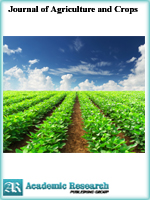Journal of Agriculture and Crops
Online ISSN: 2412-6381
Print ISSN: 2413-886X
Print ISSN: 2413-886X
Quarterly Published (4 Issues Per Year)

Archives
Volume 5 Number 7 July 2019
Agrochemical Indications of the Deposits of Azerbaijan and Effect of Erosion Process on Plant Productivity
Authors: Dr. M. A. Guliyeva
Pages: 112-116
DOI: doi.org/10.32861/jac.57.112.116
Abstract
Taking all these into account, it is important to increase the fertility of the soil from the erosion process in Ismayilli and to prevent the washing of fodder crops from perennial herbs. The cultivation of these plants in the mountainous regions protects the slopes from the terrible erosion process and provides the animals with a strong fodder. It is proved by the results of the research that restoration of fertility and ecological balance of erosion lands and the implementation of soil-agro-technical measures to increase productivity are of great importance. Due to the application of these measures, I, as a result of improving the water and physical properties of the affected land, prevent surface water flows. In addition, the results of the study have been proven by the fact that, for certain reason, erosion and erosion hazards are most likely to be taken over by the sowing of perennial herbs. Thus, perennial herbs, in particular, accumulate the nitrogen atmosphere of the legumes, enriches the soil with organic matter, accelerates the formation of water-resistant granular - topical structure and improves its water-physical properties, which in turn facilitates the rapid digestion of foodstuffs.
Evaluation of the Exact Spraying Time of Chemicals for Management of Bruchus Pisorum Under Field Condition's
Authors: Yimame Kidist Teferra ; Bittre Fikre Dubale
Pages: 109-111
DOI: doi.org/10.32861/jac.57.109.111
Abstract
Ethiopia have highly potential to produce field pea, this crops produce in Ethiopia from ancient time still now and the societies use it for different purpose such as to prepare cultural food, in household consumption and as a source of income. It is substantial crop and substitute meat nutritional value, as a source of protein. Field pea production has different constraints such as weed, disease and insect pest problems, and bruchuspisorum is major insect pest which is decline quantity of production in Ethiopia. The experiment was done at Holleta Agriculture Research center in the field condition with four replication in Completed Randomized Block Design. The objective of this study was to distinguish the exact chemical spraying time in the field to control bruchuspisorum. The variety was Adi, Wolemera, Markos and Burkitue, the chemical treatment were spraying during, early flowering, flat and full podded as recommended level, three times in every week. As a result there was significance difference between pre flowering chemical spraying time, flat podded spraying and full podded spraying time, on the number of larvae per pod (F13,18 at 0.005=11.13, p<0.0001). There was least recorded of number of larvae on per pod in full and flat pod spraying time. Even if there was no significance difference among the flat and full podded spraying time, in full podded spraying time, there was no larvae recorded totally. So in order to manage field pea bruchuspisorum in the field condition, the chemical spraying must be started from flat podded and will continued until to full podded.



